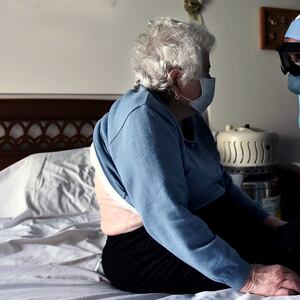Health-care workers and public employees in 10 states filed 40 complaints with the Occupational Safety and Health Administration on Tuesday, claiming employers failed to protect them on the frontlines of the coronavirus pandemic. The deluge suggests that even if the dangerous shortage of personal protective equipment (PPE) shows signs of abating, disputes between hospitals and their employees may just be getting started.
At least 35 registered nurses at Steward Hillside Rehabilitation Hospital in Warren, Ohio are in “imminent danger” of infection and serious illness in two patient care units, where at least two nurses contracted confirmed or suspected cases of COVID-19, according to one of the complaints. That complaint also claims management at the hospital “failed to conduct risk assessments to assess when respiratory or other PPE is needed, resulting in staff exposures.”
“We deserve to be safe at work so we can do our job caring for patients, but the hospital failed me, my coworkers and the community,” Nara Owens, a nurse at the hospital who claims she contracted the virus through one of those alleged failures, said in a statement from the American Federation of Teachers (AFT). The union spearheaded the mass filing in conjunction with locals, and several of the complaints were provided exclusively to The Daily Beast.
Hospital management also allegedly “threatened to retaliate against workers for using or sharing PPE from outside sources,” though some N95 masks were provided by the local leadership of the Ohio Nurses Association, the complaint claims.
“The safety of our patients and employees is always our top priority,” said a spokesperson for Hillside, in a statement. “The clinical team caring for COVID-19 patients have all volunteered to do so. At all times, our volunteers have been provided proper—and authenticated—personal protective equipment, including masks, gowns, face shields, goggles, gloves and shoe covers, to safely and responsibly care for patients while protecting themselves.”
The statement added that all of those volunteers have been educated, trained, and FIT tested on how to properly use personal protective equipment.
“All patients are screened, temperature checked and masked upon admission,” the statement continued. “Our staff are screened upon arrival every day and instructed to self-monitor their temperatures throughout the day. We continue to follow the guidelines established by the CDC.”
The American Federation of Teachers’ health-care division represents more than 112,000 health professionals, more than half of whom are registered nurses. The outbreaks in states where the complaints have been filed—New York, New Jersey, Connecticut, Ohio, Wisconsin, Montana, Oregon, Alaska, Maryland, and West Virginia—have ravaged communities, flooded hospitals, and infected everyone from frontline workers to their families. Meanwhile, a national PPE crisis and overwhelming patient load has seen nurses across the country file civil lawsuits demanding more protection, calling the facilities where they work a “war zone,” and even holding walkouts and sit-ins.
In another complaint against Backus Hospital in Connecticut, Sherri Dayton, an emergency nurse, wrote that the hospital “is not providing healthcare workers with N95s when coming into close contact with suspected and confirmed COVID patients,” who themselves are not made to wear surgical masks. “The hospital has surgical masks for every patient, but is not requiring patients to wear them in the room,” wrote Dayton. “The hospital also has N95s but is not giving them to employees who are caring for unmasked patients.”
In a statement, Dayton called the complaint “an example” she felt compelled to set after “my employer forced me to crisis ration masks and gowns.”
In response to Dayton’s complaint, Dr. Ajay Kumar, Chief Clinical Officer of Hartford HealthCare—which runs the hospital—said that “safety is of paramount importance” to the facility.
“Hartford HealthCare provides staff with personal protective equipment, or PPE, to keep them safe and our patients safe,” said Kumar. “All employees have masks, and N95 respirators. They are used consistent with or better than CDC guidelines. While we are confident in our current preparedness and work every day to secure PPE for the future, there is a worldwide shortage of PPE. In order to protect colleagues now and into the future, we are asking everyone in our organization to be disciplined, but always safe, in the use of PPE.”
Along with the mass filing, the AFT and its affiliated unions launched a petition on Tuesday demanding OSHA issue an emergency temporary standard to protect healthcare workers from infectious diseases like the novel coronavirus. The agency has reportedly begun “massive” inspection efforts following a directive on April 13 placing increased priority on COVID-19 and other pandemic-related inspections at medical facilities.
“It is unconscionable that employees still have to work with defective equipment at this late date in a global pandemic,” said Debbie White, a registered nurse and president of Health Professionals and Allied Employees in New Jersey, an AFT-affiliated union, which filed complaints on behalf of employees at Hackensack Meridian Health’s Palisades Medical Center in New Jersey and at the long term care facility attached to the hospital, called The Harborage.
“Health care workers need to be able to work safely without fear of contracting the virus and transmitting it to other patients, coworkers, or their families,” said White. “They must have genuine N95 respirators and must be fit-tested for those respirators to ensure there’s a seal of the mask around their faces. If it’s not sealed, it’s not safe.”
Dr. Anthony Passannante, the chief hospital executive at Palisades Medical Center, said in a statement on Tuesday that its policies and procedures, which are “in place to protect our team members and patients” are “all in accordance with CDC guidelines.”
“The current global health care crisis does not negate their importance,” said Passannante. “Our priorities are to provide a safe work environment for our team members so they can provide the best possible care for our patients.”








